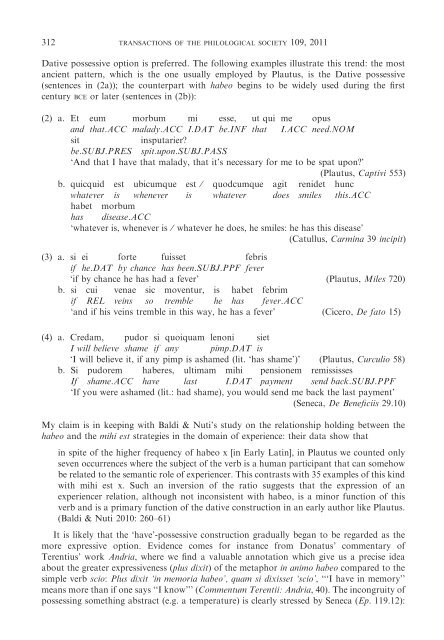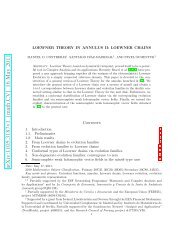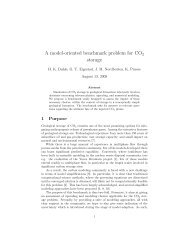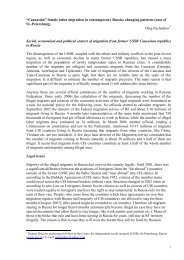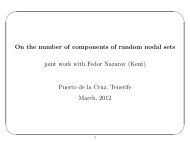Experiential metaphors in Latin - Wiley Online Library
Experiential metaphors in Latin - Wiley Online Library
Experiential metaphors in Latin - Wiley Online Library
Create successful ePaper yourself
Turn your PDF publications into a flip-book with our unique Google optimized e-Paper software.
312<br />
TRANSACTIONS OF THE PHILOLOGICAL SOCIETY 109, 2011<br />
Dative possessive option is preferred. The follow<strong>in</strong>g examples illustrate this trend: the most<br />
ancient pattern, which is the one usually employed by Plautus, is the Dative possessive<br />
(sentences <strong>in</strong> (2a)); the counterpart with habeo beg<strong>in</strong>s to be widely used dur<strong>in</strong>g the first<br />
century BCE or later (sentences <strong>in</strong> (2b)):<br />
(2) a. Et eum morbum mi esse, ut qui me opus<br />
and that.ACC malady.ACC I.DAT be.INF that I.ACC need.NOM<br />
sit <strong>in</strong>sputarier?<br />
be.SUBJ.PRES spit.upon.SUBJ.PASS<br />
‘And that I have that malady, that it’s necessary for me to be spat upon?’<br />
(Plautus, Captivi 553)<br />
b. quicquid est ubicumque est ⁄ quodcumque agit renidet hunc<br />
whatever is whenever is whatever does smiles this.ACC<br />
habet morbum<br />
has disease.ACC<br />
‘whatever is, whenever is ⁄ whatever he does, he smiles: he has this disease’<br />
(Catullus, Carm<strong>in</strong>a 39 <strong>in</strong>cipit)<br />
(3) a. si ei forte fuisset febris<br />
if he.DAT by chance has been.SUBJ.PPF fever<br />
‘if by chance he has had a fever’ (Plautus, Miles 720)<br />
b. si cui venae sic moventur, is habet febrim<br />
if REL ve<strong>in</strong>s so tremble he has fever.ACC<br />
‘and if his ve<strong>in</strong>s tremble <strong>in</strong> this way, he has a fever’ (Cicero, De fato 15)<br />
(4) a. Credam, pudor si quoiquam lenoni siet<br />
I will believe shame if any pimp.DAT is<br />
‘I will believe it, if any pimp is ashamed (lit. ‘has shame’)’ (Plautus, Curculio 58)<br />
b. Si pudorem haberes, ultimam mihi pensionem remississes<br />
If shame.ACC have last I.DAT payment send back.SUBJ.PPF<br />
‘If you were ashamed (lit.: had shame), you would send me back the last payment’<br />
(Seneca, De Beneficiis 29.10)<br />
My claim is <strong>in</strong> keep<strong>in</strong>g with Baldi & Nuti’s study on the relationship hold<strong>in</strong>g between the<br />
habeo and the mihi est strategies <strong>in</strong> the doma<strong>in</strong> of experience: their data show that<br />
<strong>in</strong> spite of the higher frequency of habeo x [<strong>in</strong> Early Lat<strong>in</strong>], <strong>in</strong> Plautus we counted only<br />
seven occurrences where the subject of the verb is a human participant that can somehow<br />
be related to the semantic role of experiencer. This contrasts with 35 examples of this k<strong>in</strong>d<br />
with mihi est x. Such an <strong>in</strong>version of the ratio suggests that the expression of an<br />
experiencer relation, although not <strong>in</strong>consistent with habeo, is a m<strong>in</strong>or function of this<br />
verb and is a primary function of the dative construction <strong>in</strong> an early author like Plautus.<br />
(Baldi & Nuti 2010: 260–61)<br />
It is likely that the ‘have’-possessive construction gradually began to be regarded as the<br />
more expressive option. Evidence comes for <strong>in</strong>stance from Donatus’ commentary of<br />
Terentius’ work Andria, where we f<strong>in</strong>d a valuable annotation which give us a precise idea<br />
about the greater expressiveness (plus dixit) of the metaphor <strong>in</strong> animo habeo compared to the<br />
simple verb scio: Plus dixit ‘<strong>in</strong> memoria habeo’, quam si dixisset ‘scio’, ‘‘‘I have <strong>in</strong> memory’’<br />
means more than if one says ‘‘I know’’’ (Commentum Terentii: Andria, 40). The <strong>in</strong>congruity of<br />
possess<strong>in</strong>g someth<strong>in</strong>g abstract (e.g. a temperature) is clearly stressed by Seneca (Ep. 119.12):


